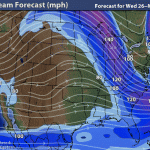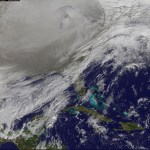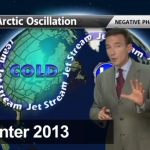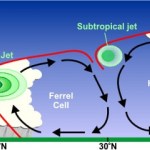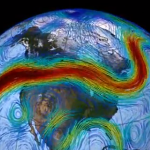Jet Stream
From meteorologist Paul Douglas:
Published on Mar 14, 2014
Weather seems to be staling. Look into how the speed of the jet stream causes this "stuck in a rut" weather pattern. Meteorologist Paul Douglas also takes a look back as to how this winter compares to years past. Checking out extreme drought conditions, snow cover and cooler temperatures overall. This did not only impact the U.S. but other areas of the world. England experienced their wettest winter yet!
The anti-scientific M.O. of some political conservatives was in full swing during the 'polar vortex,' as frigid weather brought south from the Arctic led many commentators to scoff, "look how cold it is, can you believe anyone thinks the Earth is getting warmer?" Coby Beck adds some perspective from climate historian Christopher C. Burt on A Few Things Ill-Considered, writing "cold snaps like this past week’s used to occur every couple of years in the 1800′s," and more like every 5-10 years in the 1900's. Meanwhile the last time it got so cold in the U.S. was twenty years ago. Coby says "what…
Extreme weather events of all kinds seem to be more common now than they were then. By now I mean the last five to ten years, approximately, and by then I mean ... well, before that. This is because of global warming.
The current Colding caused by a wandering Polar Vortex (which I've heard Rush Limbaugh has declared to be a liberal plot ... thanks Obama!) is probably a result of changes in the nature and configuration of the jet streams and related air masses, as discussed here. Warming caused by the release of fossil carbon, mainly as Carbon Dioxide, has affected the Arctic more than most…
Coldness can manifest where you least expect it: on a planet rapidly warmed by the combustion of fossil fuel, or in the heart of a star 250 times as massive as our own. On Greg Laden's Blog, Greg explains that an apparent "recovery" of Arctic sea ice from its historic low in 2012 does not invalidate the long-term trend. Greg also explains this year's legacy of extreme weather, such as snow in Cairo, writing that when there is less difference in temperature between equatorial and polar regions, "the jet streams get all wiggly and cause northerly air to reach far to the south in some places and…
Global Warming is the increase in the Earth's temperature owing to the greenhouse effects of the release of CO2 and other gasses into the atmosphere, mainly by humans burning fossil fuel, but also by the release of Methane from oil wells and melting of Arctic permafrost, natural gas from leaky pipes, and so on. This increase in temperature occurs in both the atmosphere and the oceans, as well as the land surface itself. During some periods of time most of the increase seems to happen in the atmosphere, while during other times it seems to occur more in the oceans. (As an aside: when you…
I think most people will agree that in North America (and other places) we've been having some bad weather. Some of the weather is not necessarily intrinsically bad ... so what if it is a little cooler or a little warmer than you expect. Aridity? Deserts are nice! Extra rainfall? Great for the plants. But actually that sort of thing has its down side since important systems like agriculture, the water supply, and Spring Break work reasonably well because of expectations that might not be met if the weather is different.
Other weather is intrinsically bad. I'd mention tornadoes but at the…
